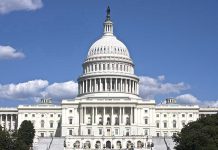
President Trump’s emergency action has put a critical halt to a looming Long Island Rail Road strike, exposing deep union tensions and the high-stakes battle over government power, fiscal responsibility, and the everyday lives of nearly 300,000 commuters.
Story Snapshot
- President Trump intervened with an emergency board, pausing a major LIRR strike for at least four months.
- The dispute highlights the clash between union demands and efforts to control runaway public sector costs.
- Nearly 300,000 daily riders—and the regional economy—were at risk of disruption.
- Federal and state leaders are divided over responsibility and the best path forward.
Trump’s Executive Order Halts Strike Threat—for Now
President Trump signed an executive order establishing an emergency board to mediate the contract standoff between the Long Island Rail Road (LIRR) and several powerful unions. This decisive intervention, authorized under the Railway Labor Act, immediately put the brakes on a strike that would have crippled transit for hundreds of thousands across the New York metro region. The move signals the administration’s commitment to keeping essential infrastructure running, even as labor leaders press for sweeping pay increases and better terms.The LIRR dispute is more than a battle over paychecks—it is a flashpoint in the national debate over government spending, union influence, and the limits of federal intervention. The unions, including the Brotherhood of Locomotive Engineers and Trainmen, overwhelmingly voted to authorize a strike after rejecting management’s proposals and arbitration offers. With negotiations stalled, union leaders formally requested White House involvement, setting the stage for Trump’s action. The emergency board now has several months to broker a compromise, but the risk of a full-blown strike returns if no deal is reached by May 2026.
High Stakes for Commuters, Economy, and Conservative Values
The LIRR carries nearly 300,000 riders daily, making it the busiest commuter railroad in North America. A shutdown would have paralyzed the region’s economy, causing ripple effects for businesses, workers, and families who rely on consistent transportation. For many, this crisis is a direct result of years of unchecked union power and escalating public sector costs—issues that conservative Americans have long warned about. Trump’s intervention aligns with core constitutional values of limited government and fiscal restraint, aiming to protect taxpayers and daily commuters from being held hostage by labor brinkmanship.
Governor Kathy Hochul’s response has been sharply critical, blaming both union leadership and the Trump administration for allowing tensions to escalate. While state officials apply public pressure, their authority is limited under the federal Railway Labor Act, leaving the federal government as the main arbiter. This dynamic underscores persistent concerns over government overreach and the erosion of local control—a recurring theme in debates about labor, education, and constitutional rights.
Federal Power, Union Tactics, and the Road Ahead
The emergency board process is designed to prevent strikes, but labor experts caution that it often postpones rather than solves fundamental disputes. Commuters, meanwhile, face ongoing uncertainty, with the threat of a disruptive strike delayed but not eliminated. Management accuses unions of making unrealistic demands that risk public welfare, while union advocates argue they are fighting for fair compensation and better working conditions. The outcome of these negotiations will set a precedent for future labor conflicts in transit systems nationwide, with implications for how far federal power should reach in local disputes.
In the short term, Trump’s executive order ensures that trains keep running and families avoid chaos. But the deeper questions—about unchecked union influence, runaway government spending, and the proper role of federal intervention—remain unresolved. For conservatives, this episode reinforces the need for vigilance against forces that threaten constitutional principles, personal responsibility, and the common sense values that keep America moving forward.
Sources:
Trump establishes emergency board to resolve Long Island Rail Road union dispute
Statement from Governor Kathy Hochul


















